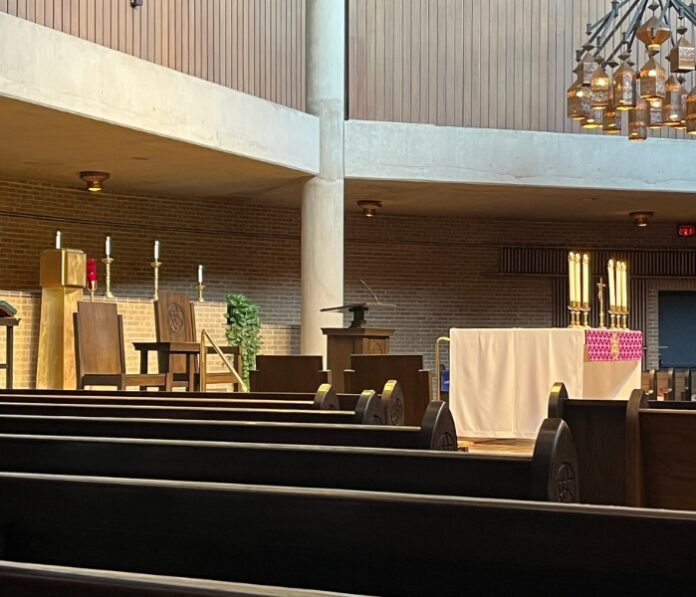Encouraging habits of respect, gratitude and presence
The landing page of UD’s website describes “truth, wisdom and virtue” as some of the main things our Core Curriculum encourages us to explore. College is more than just a place where we get to expand our knowledge; it is also a preparation for our adult lives, an introduction to handling our responsibilities on our own, identifying our priorities and aligning our daily habits with those priorities.
It is said that how we spend our days is how we spend our lives, so how can we make our daily small actions the embodiment of virtue? What if we let our inner values be reflected in how we show up to class each day?
At UD, we are blessed with professors who are not only deeply knowledgeable and committed to sharing wisdom, but are also spiritually present. They give us their undivided attention every day, whether during lectures, office hours or inspiring panels and talks in which they take part.
To mirror this unconditional “dasein” that our faculty offers, let’s identify potential threats to our ability to be present in the classroom, and let’s consider how small actions can have great implications.
Showing up to class prepared and on time is easy, but is physical presence enough? Our busy lives, between the balance of school, social life, hobbies and screens can be enemies to our focus. Being aware of where our mind is during class is key to our long-term success.
Even when we think we are listening attentively, small things like packing up before class has ended decrease both our abilities and our classmates’ abilities to be present. Furthermore, waiting to pack up until class ends shows respect to our professors.
Besides dedicated professors, our university offers a wealth of resources that set us up for academic and lifelong success: tutors, counselors, the Office of Academic Success, the Office of Personal Career Development and strategic tools like OptimalWork and our syllabi. All of these resources serve as guides not only to our course subjects but also to our broader goals.
Resourcefulness is a virtue that can help us to be more effective in our problem-solving, adaptability and proactivity. Being aware of how to best prepare for class, assignments and exams or how to manage our daily schedule and due dates can help us to use our professors’ and classmates’ time better. This awareness eliminates logistical problems and allows us to focus on understanding class material.
Virtue is not something we possess;it is something we practice. It starts small – with our posture, our tone, our timeliness. We don’t have to flawlessly embody our ideals, but being aware of our priorities and the effect that our actions have on our environment can significantly shape our attitude and campus community.
You don’t have to make a grand statement to contribute to classroom culture. Maybe it is enough to show interest and gratitude. Rather than treating classes and responsibilities as part of a to-do list, we can see them as opportunities to grow closer into the person you want to be.
Do you want to be someone who asks courageous questions – helping your fellow students to be brave and knowledgeable – or one who allows fear or pride to limit your development? Is college education merely an obligation that we are expected to complete, or is it an opportunity to grow our knowledge and understanding of the world and its people? Isn’t it a chance to shape our beliefs and improve our lives and the lives of those around us?
Should we aim to make our life easier in the short term by aiming to pass our classes, or focus on long-term success – aiming for deeper understanding and resisting distractions from screens or other vices? Shouldn’t we embrace the hard parts of life, thus making them easier over time and preparing ourselves for greater challenges?
These decisions aren’t only academic, but also moral. They ask us to practice the virtues that our Faith holds dear: prudence, fortitude, humility and charity.
When starting a Golden Hour on OptimalWork, we are asked what virtue we want to grow during that hour. Upon picking one, for example, ‘Working with Purpose,’ we are asked a question aimed to help us put this virtue into practice, and consider who can benefit from our growth.
This practice aligns closely with our Faith: forming ourselves not only for our own sake, but for the sake of others. Knowing the what and why of our goals can help us figure out the how.
If we can bring more presence, gratitude and courage into our classrooms by taking small steps like finishing class with full attention or asking thoughtful questions, we build a culture that honors our values and one another – one that echoes the dignity we are called to recognize in every human person.
Intentionally seeking virtue on top of truth and wisdom in our academic life makes class more fulfilling and joyful. It shapes not only our academic journey, but also the people we become.

